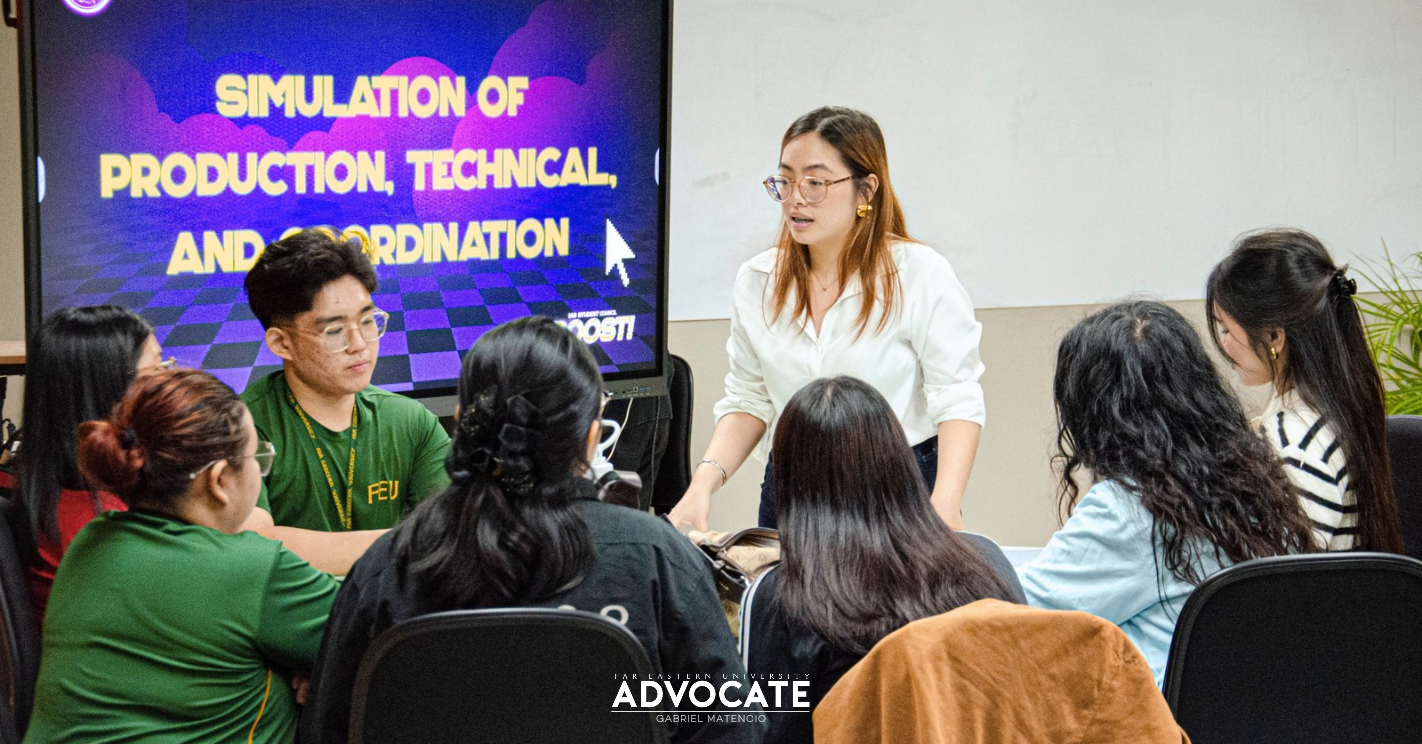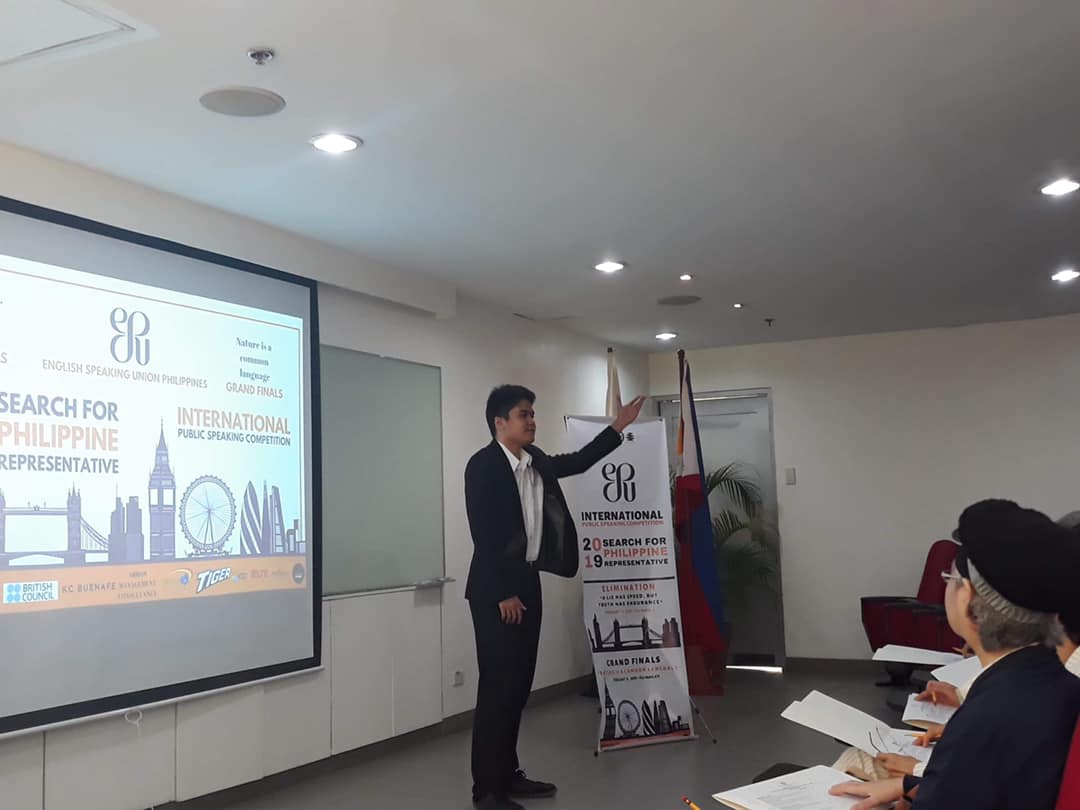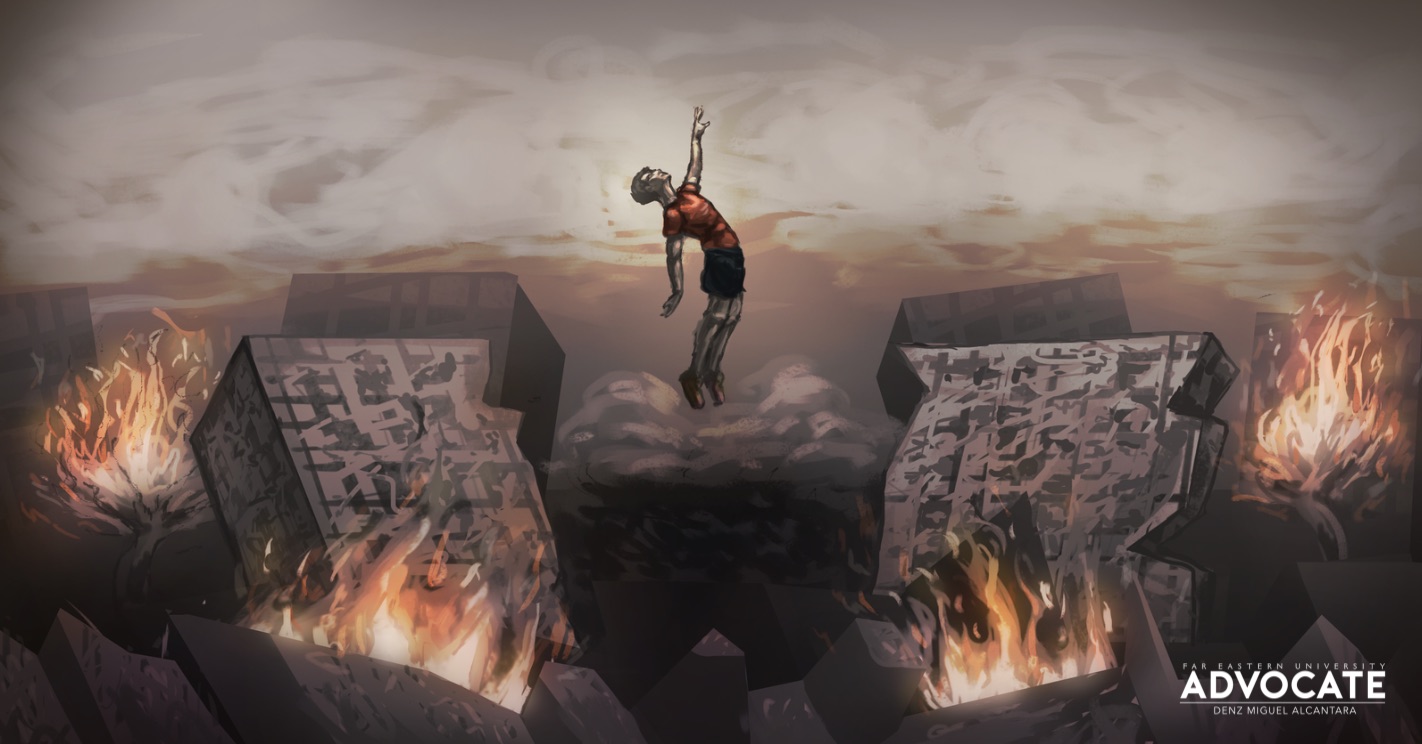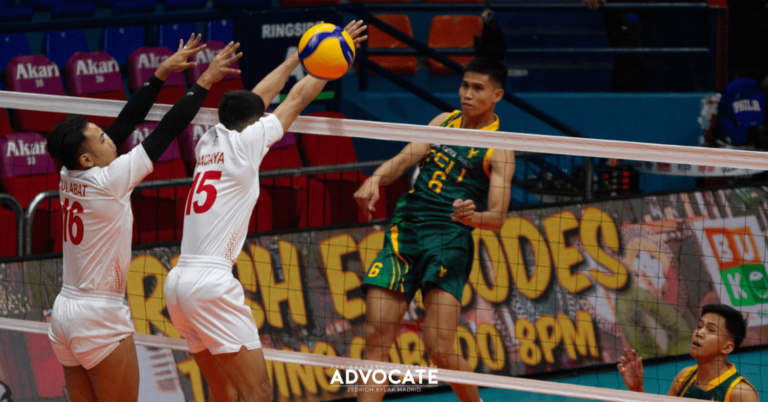
FEU IL Dean steps down after 9 years in service
- January 26, 2023 09:40
FEU Advocate
May 30, 2025 14:41
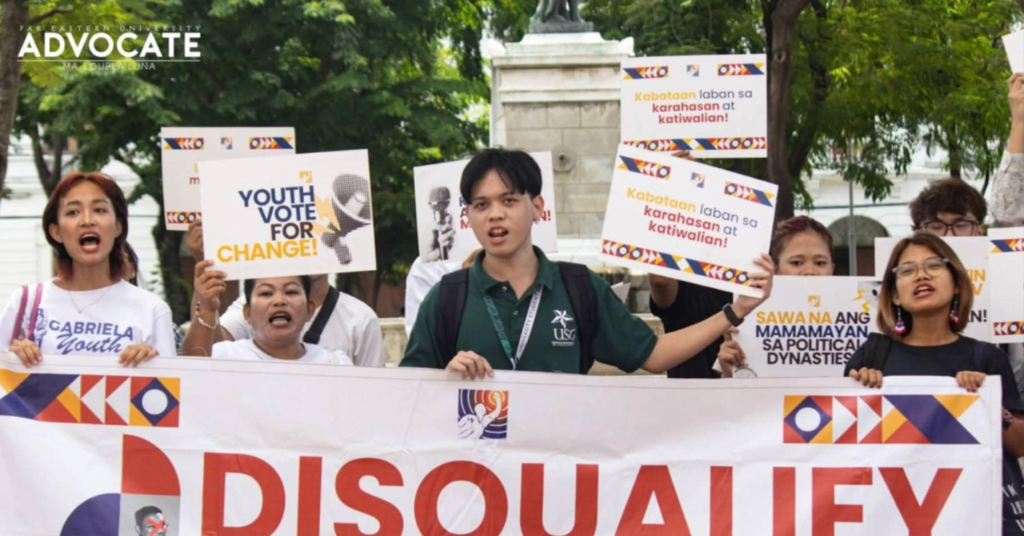
By Shayne Elizabeth T. Flores
As the Duterte Youth party-list’s proclamation remain suspended, progressive youth groups and youth election watchdog Kabataan Tayo ang Pag-asa (KTAP) amplified the call for the party-list’s ‘immediate’ disqualification by filing a petition to the Commission on Elections (COMELEC) at its National Headquarters in Intramuros last May 27.
During the proclamation of winning party-lists at Manila Hotel Tent City last May 19, COMELEC suspended the proclamation of Duterte Youth due to pending disqualification petitions.
A petition was first filed against Duterte Youth in 2019, asserting the nullification of their registration as it did not follow the required legal procedure. After being left unresolved for over five years, the petition was revived in March.
Moreover, another petition was filed on May 8, condemning the Duterte Youth’s red-tagging of other election candidates, which violates election rules.
Disqualification grounds
In an interview with FEU Advocate, KTAP National Convenor Brell Lacerna claimed that COMELEC has more than enough grounds to fully disqualify Duterte Youth given their track record.
“Sinasabi ng COMELEC that this is the hardest case… Hinog na ang mga batayan para i-disqualify na ang Duterte Youth mula sa pagka-suspend nito. Ang dami nang mga reasons as to why—nullified ‘yung registration at the very first place at dagdag din dun ay ang daming nilabag na karapatang pantao lalo na sa mga kabataan (COMELEC claims that this is the hardest case. There are already solid grounds to disqualify the Duterte Youth, such as their nullified registration and offenses against human rights, especially the youth’s),” he said.
Moreover, Student Christian Movement of the Philippines National Chairperson Kej Andres pointed out how the Duterte Youth keeps quiet and goes against issues and advocacies the youth stand for.
“‘Yung mga kabataan nagka-clamor para sa free education… and human rights pero kabaligtaran ang panawagan ng Duterte Youth. Minsan pa nga wala silang stance dun sa mga clamors at mga panawagan ng Duterte Youth… Sa halip na magbigay ng mas maraming avenues para ang kabataan makapag-speak-up at makapag-organize ay sila 'yung naghi-hinder [ng] role natin towards activism and social justice,” Andres explained in a separate interview.
In the event that COMELEC fails to fully disqualify Duterte Youth while still providing them Congress seats in the end, progressive youth groups perceived how it would be a setback to forwarding true youth representation.
Furthermore, they argued that Duterte Youth poses a big threat to the progressive youth when it comes to perpetrating red-tagging in the Congress.
“Ang mga kabataan ngayon, nananawagan na i-disqualify ang Duterte Youth mula na naman sa maraming batayan nito, ilegal na pangangampanya, void from the very beginning, at red-tagging against the youth itself. So all the more reason na hindi na dapat ito parang ‘yes or no’ question na lamang ng COMELEC, agad-agaran na dapat na i-disqualify ang Duterte Youth,” Lacerna added.
Misrepresentation among winning PLs
Moreover, Gabriela Youth National Spokesperson Francheska Reyes asserted that the Duterte Youth’s proclamation would betray the principle of the party-list system, which should amplify the interests of marginalized sectors.
“Kinikilala natin na ang party-list system ay binuo ito upang ma-amplify ‘yung interest ng mga marginalized sector pero sa gana na mauupo ‘yung mga fake partylist katulad na lamang ng Duterte Youth ay isang pag-betray mismo sa very reason ng pag-exist ng partylist system,” Reyes stated in an interview.
Based on the 1987 Constitution and Republic Act No. 7941 or Party-List System Act, the party-list system ought to serve as a platform for marginalized sectors, by providing their representatives a seat in the Congress.
However, following the Supreme Court’s (SC) 2013 ruling stipulating that parties “do not need to organize along sectoral lines and do not need to represent ‘any marginalized and underrepresented’ sector” to join the elections, the presence of dynastic political figures have become prevalent in the system, per University of the Philippines political science professor Crisline Torres-Pilapil.
Along with Duterte Youth, Bagong Henerasyon (BH) party-list was also suspended due to a pending petition filed by lawyer Russell Stanley Geronimo last May 14. According to him, BH violated the Omnibus Election Code, specifically Sections 261(i) for intervention of public officers and employees, and 261(o) for the use of public funds or state-owned facilities for an election campaign.
Despite the suspensions, election watchdog Kontra Daya claimed that more than half of the 63 incoming party-list representatives still do not represent the marginalized in a statement posted last May 19.
According to their party-list groups data set released in February, 22 incoming party-lists were identified as part of political dynasties, nine belong to big businesses, four are affiliated to military or the police, and three have pending corruption cases. Additionally, three are flagged for having dubious advocacies, while one party-list lacked information about itself.
Overall, 34 out of 54 winning party-list groups were flagged by Kontra Daya, with cases of multiple flagging. This included Duterte Youth and BH, which were additionally tagged for their affiliation with the military and big businesses.
According to progressive youth groups, the party-lists that should be elected are those truly coming from the marginalized and underrepresented sectors.
As a result, Lacerna asserted the need to amend the Party-List System Act in order to elect parties that truly cater to the interests of the marginalized.
“Nakakabahala ito sa election system na pinangangalagaan natin, kaya all the more na ang kailangan ngayon higit na i-empower ang mga marginalized communities natin. Dagdag din nito, ay i-amenda na ang Party-List Law para tunay na irepresenta nito ang tunay na marginalized at underrepresented,” he noted
Similarly, Reyes highlighted how youth representation should be anchored to grassroot campaigns as well as take into account women’s rights.
In light of Gabriela Women’s Party’s 21-year congressional term ending, the Gabriela Youth national spokesperson further underlined young women’s continued struggle to have a voice among political dynasties and capitalists.
“Isang malaking dismaya na hindi makaupo ‘yung Gabriela Women’s Party-list na sa matagal na panahon ay isinusulong ‘yung kagalingan at karapatan ng mga kababaihan, bata, LGBTQIA+, at bayan kung kaya’t patuloy talagang hamon sa ating mga kabataang kababaihan, na itulak na magkaroon tayo ng tunay na boses sa loob ng Kongreso sa panahon na ang mauupo na naman ay mga political dynasties at mga big bureaucrat-capitalists,” she raised.
Electoral fraud
Beyond the misaligned party-list system, Lacerna further shed light on the cases of electoral fraud that enabled the win of “fake” party-lists.
“Hindi naman kasi dapat lang na fake partylist ang tinututulan ng mga kabataan, ang dapat na ikinakagalit ng kabataan ay pandaraya—pandaraya sa eleksiyon at ang pananatili ng fake partylists, pandaraya yan. Ang daming nangyaring pandaraya sa eleksyon natin ngayon. Sa talamak na vote-buying, automated counting machine breakdowns, we challenge the COMELEC to investigate all forms of electoral fraud,” he emphasized.
In their final report, International Observer Mission, an international poll observer, noted eight critical issues that rendered the Philippine 2025 midterm elections as “neither free, nor honest, nor fair.”
The issues included red-tagging, voter disenfranchisement and automated counting machines malfunctions, vote-buying, violence, violations of International Humanitarian Law, and harassment of international poll observers.
According to Lacerna, the prevalence of electoral fraud can be traced to the country’s lack of a comprehensive curriculum addressing the electoral system, emphasizing the importance of promoting advocacy groups, youth-led watchdogs, and alternative education.
“Hindi nga alam ngayon ng mga kabataan na talamak ang pandaraya sa isang automated election system. Hindi nga alam ng mga kabataan sa kasalukuyan kung ano nga ba ang esensiya ng mga partylist kasi matagal na itong bina-bastardize kaya all the more reason na ang mga pag-aaral, ang mga ganitong mga initiatives ng mga youth, nilalapit siya sa mga paaralan, and at the same time, nilalapit pa sa marami pang communities,” he added.
The KTAP convenor further stated they would not stop at disqualifying the Duterte Youth only, but will also scrutinize other proclaimed party-lists belonging to political dynasties and big businesses.
Meanwhile, regardless of COMELEC’s final decision, Andres affirmed that the youth will continue to find a way to advance true representation both inside and outside of the Congress.
“Mararamdaman at mararamdaman ng mga kabataan na nasa krisis-panlipunan tayo at ang isang pekeng representasyon ng kabataan sa Kongreso ay nagpapalala ng krisis ng lipunan na nararanasan ng kabataan at—siyempre—ng mga susunod na henerasyon. Kaya kung hindi man tayo palarin, at makapasok sila, makakahanap at makakahanap tayo ng mga paraan para lalong paigtingin at palakasin yung tunay na youth representation sa loob at labas ng Kongreso,” he underlined.
As of writing, Duterte Youth have filed a petition to the SC claiming that the COMELEC committed grave abuse of discretion in postponing the declaration of their win.
Meanwhile, BH submitted an urgent motion for its proclamation, insisting that they did not violate any election laws.
Securing the second highest number of votes at 2,338,564, Duterte Youth was supposed to be given three house seats. On the other hand, BH accumulated 319,803 votes, entitling them to one seat.
With four seats remaining vacant, COMELEC pledged to resolve the issue before the 20th Congress opens on June 30.
- With reports from Ma. Louela Luna
(Photo by Ma. Louela Luna/FEU Advocate)

